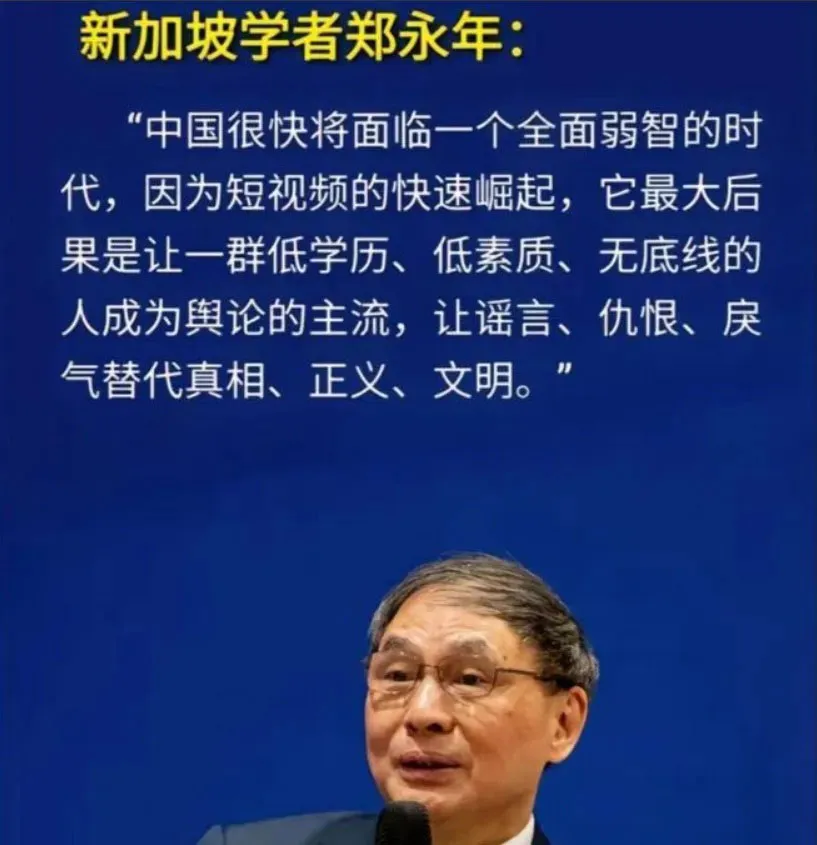本文的主要论点来源自:

随着短视频的普及,许多人陷入了刷视频的循环。无论是为了寻找快乐,还是消磨时间,短视频似乎总能满足内心的需求。然而,当我们沉迷于此,时间悄然流逝,我们的大脑也正在悄然被改变。

短视频为何让人难以抗拒?
短视频平台采用了复杂的算法推荐机制,它们会分析用户的行为习惯,深入挖掘内心的偏好,然后精准推送感兴趣的内容。这种机制不仅让人欲罢不能,还会逐渐形成一种“回路效应”。喜欢的内容反复出现,不喜欢的内容被自动过滤。久而久之,用户被困在自己的信息茧房中,视野被限制,世界被碎片化。

短视频为何会让人变得“弱智”?
从认知、思维到情绪管理,短视频对我们的负面影响主要表现在以下几点:
- 认知的狭隘化
短视频的推荐机制让我们误以为了解了世界,但实际上,我们只是在一个个小碎片中循环,错过了更广阔的认知视野。打开父母的短视频平台,发现彼此的世界完全不同,这正是算法分隔的结果。 - 知识的碎片化
看似学到了很多,实际上只是浅尝辄止。短视频内容多以轻松娱乐为主,缺乏深度。当人们习惯于这种即时满足的知识获取方式,就很难再进行深入学习。 - 耐性的丧失
长时间接触短平快的内容,会降低人们对复杂内容的接受度。三分钟的视频嫌长,五分钟的内容直接跳过。渐渐地,深度阅读和思考变成了一种奢侈。 - 情绪的极端化
短视频平台的互动模式容易激发人们的情绪。热点事件中,人们往往迅速站队,情绪化评论不断升级。这种极端情绪不仅影响个体,也让群体智商下降。
如何应对短视频的负面影响?
短视频本身并非罪魁祸首,问题在于我们对其使用方式的掌控。

- 主动管理使用时间:设定明确的使用时限,避免长时间沉浸。
- 培养深度思考习惯:通过阅读书籍、参加讨论等方式,提高思维深度。
- 建立多元信息渠道:尝试关注不同领域的内容,打破信息茧房。
- 关注真实社交:减少线上互动,增加面对面交流,恢复真实的人际连接。

娱乐的初衷是放松和愉悦,但当它开始侵蚀我们的时间和智慧,就需要引起足够的警惕。我们可以适当放松,但不能任由短视频主导生活,成为信息时代的“智商奴隶”。
The Allure of Short Videos: When Entertainment Becomes a Trap for Collective Dumbing Down
With the rapid rise of short videos, countless individuals find themselves trapped in an endless cycle of scrolling. Whether to find happiness or to kill time, short videos always seem to cater to our needs. However, as we indulge, precious time slips away, and our minds undergo subtle but significant changes.
Why Are Short Videos So Addictive?
Short video platforms leverage sophisticated algorithms that analyze user behavior, dig deep into preferences, and precisely push content that aligns with those interests. This mechanism not only hooks users but also creates a “feedback loop.” Favorable content is repeatedly shown, while less appealing content is filtered out. Over time, users become ensnared in an echo chamber, their perspectives narrowed, and their world fragmented.
How Do Short Videos Contribute to “Dumbing Down”?
From cognition and thought processes to emotional regulation, the adverse impacts of short videos manifest in several ways:
- Narrowed Cognition
The recommendation algorithm gives the illusion of understanding the world, but in reality, users are confined to fragmented realities. Differences in short video feeds between individuals highlight the isolating effect of these algorithms. - Fragmented Knowledge
While it seems like learning is happening, it is often superficial and fleeting. Short video content tends to prioritize entertainment over depth, leading to a lack of substantial understanding and critical thinking. - Erosion of Patience
Consuming short, fast-paced content diminishes tolerance for complexity. Videos longer than three minutes are skipped, and deeper engagement becomes rare. - Heightened Emotional Extremes
The interactive nature of short video platforms fuels emotional reactions. In trending discussions, people quickly take sides, often escalating to heated exchanges. This contributes to groupthink and a decline in collective intellectual engagement.
How Can We Mitigate These Negative Impacts?
Short videos are not inherently harmful; the problem lies in how we engage with them.
- Manage Usage Time: Set clear limits to avoid excessive screen time.
- Cultivate Deep Thinking: Engage in reading, discussions, and other activities that foster critical analysis.
- Diversify Information Sources: Explore varied content to break free from echo chambers.
- Prioritize Real Connections: Reduce online interactions and invest in face-to-face relationships to restore genuine human connection.
Entertainment should be a source of relaxation and joy. When it begins to consume our time and intellect, it warrants serious attention. While it’s fine to unwind with short videos, it’s crucial to prevent them from dominating our lives and turning us into intellectual slaves in the digital age.
总结 | Summary
短视频是娱乐方式的一个重要组成部分,但我们需要对其潜在危害保持警惕,避免陷入时间浪费和智力下降的陷阱;同样,我们也要通过自我约束和多元化的选择,重新掌控数字生活的主动权。
声明:本站所有文章,如无特殊说明或标注,均为本站原创发布。任何个人或组织,在未征得本站同意时,禁止复制、盗用、采集、发布本站内容到任何网站、书籍等各类媒体平台。如若本站内容侵犯了原著者的合法权益,可联系我们进行处理。
Statement: Unless otherwise specified or noted, all articles on this site are original publications by our platform. Any individual or organization is prohibited from copying, stealing, collecting, or publishing the content of this site on any website, book, or other media platform without obtaining prior permission from us. If any content on this site infringes upon the legitimate rights of the original author, please contact us for resolution.




